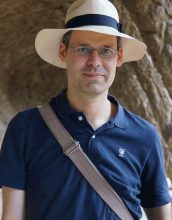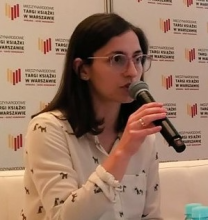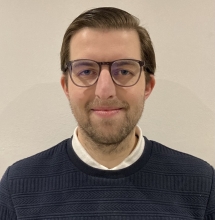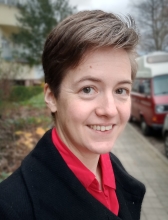The workshop is a joint initiative by the European Social Sciences and Humanities Research Infrastructures CLARIN and DARIAH and it will be organised as part of the DH 2023 Conference "Collaboration as Opportunity" that will take place on July 10-14 in Graz, Austria, at the Messe Congress Graz convention centre.
Dates and Location
- TwinTalks workshop: 10 July, 09:15- 17:00 CEST, University of Graz (Universitätsplatz 3, A-8010 Graz)
(Geidorf district, a 20-min walk from the Hauptplatz main square)
- Workshop Venue 9 | RESOWI | Section E | Third Floor | SR 15.37
Programme
08:00 - 09:00 Registrations
09:15 - 09:30 Welcome by Steven Krauwer
09:30 - 10:15 Keynote: Computational Literary Studies Infrastructure: challenges in the post-COVID era by Maciej Eder
10:15 - 10:30 Discussion
10:30 - 11:00 Coffee break
11:00 - 11:30 Experience of remote collaborative work in the ParlaMint project using Git by Tomaž Erjavec, Matyáš Kopp and Katja Meden
11:30 - 12:00 Going to the market together. A presentation of a mixed methods project by Claes Ohlsson, Shafqat Mumtaz Virk, Henrik Björck, Leif Runefelt and Nina Tahmasebi (remote presentation)
12:00 - 12:30 Analyzing the representation of politicians in the media – results and methodological concerns by Eetu Mäkelä and Pihla Toivanen (remote presentation)
12:30 - 13:30 Lunch
13:30 - 14:00 Helsinki Digital Humanities Hackathon: Lessons from Online and In-Person Modes by Eetu Mäkelä and Mikko Tolonen (remote presentation)
14:00 - 14:30 Towards a sustainable community effort: training NLP data for under-resourced language domains in CLS by Silvie Cinková and Maarten Janssen
14:30 - 15:00 Where there’s a Will, there’s a Way by Theodore Manning, Alejandro Napolitano Jawerbaum and Eugenia Lukin
15:00-15:30 Coffee break
15:30 - 16:30 Panel: The role of RIs as an enabler of remote collaboration in DH
Chair: Sally Chambers
Panellists: Ulrike Henny-Krahmer, Magdalena Wnuk, Tom Gheldof
16:30 - 16:45 Closing by Sally Chambers
Speakers
Keynote

Maciej Eder is the Director of the Institute of Polish Language at the Polish Academy of Sciences. His research interests include computer-assisted text analysis, quantitative linguistics, and machine-learning. His recent works are focused on computational stylistics, or stylometry, with special attention paid to authorship attribution. He is the principal investigator of the Computational Literary Studies Infrastructure project (CLS INFRA), founded by the European Commission under the Horizon 2020 scheme.
Panellists
Magdalena Wnuk

Magdalena Wnuk has a PhD in humanities (Institute of History of the Polish Academy of Sciences, 2018), is a cultural anthropologist, currently working as an Open Science Specialist at the Digital Humanities Centre of the IBL PAN and coordinator of OPERAS-PL – the Polish national node of OPERAS research infrastructure for the humanities and social sciences. She has been working in international teams in the NGO sector as well as in scientific projects. At the moment she is working remotely with her team in Warsaw and with collaborators from the OPERAS consortium.

He works as coordinator of CLARIAH-VL and DARIAH-BE at KU Leuven’s Faculty of Arts. After having obtained a Master's degree in Ancient History at KU Leuven, he started working as a scientific researcher for the Trismegistos project at his alma mater, which included an involvement as one of the members of the Europeana project EAGLE. Currently, he is working as a collaborator for the Erasmus+ project ENCODE. Furthermore, he acts as Belgian national moderator for the DH Course Registry and he is also one of the coordinators of the DARIAH-EU working group 'Sustainable Publishing of Metadata'. In the Bachelor of History, he currently teaches the course ‘Research Methods: Numbers, Data and Networks’ on Data and Network Analysis. Additionally, he serves as a member of the steering committee of Epigraphy.info, he is the current coordinator of the Pelagios Gazetteer Activity and he holds a junior membership status within KU Leuven's LECTIO institute.

Ulrike Henny-Krahmer is a Junior Academy Professor for Digital Humanities at the University of Rostock, Germany since 2021. She defended her doctoral thesis on "Genre Analysis and Corpus Design: Nineteenth-Century Spanish-American Novels (1830-1910)" at the University of Würzburg in the same year. She has a background in Latin American Studies and experience of working in DH projects for more than ten years. Her current research is in the areas of digital scholarly editions and computational text analysis of literary texts.
Organisers
The workshop is a joint initiative by European SSH Research Infrastructures CLARIN (http://www.clarin.eu) and DARIAH (https://www.dariah.eu/).
- Steven Krauwer (CLARIN / Utrecht University, Netherlands)
- Darja Fišer (CLARIN ERIC / Institute of Contemporary History, Slovenia)
- Iulianna van der Lek-Ciudin (CLARIN ERIC, Netherlands)
- Sally Chambers (DARIAH-EU / Ghent Centre for Digital Humanities, Belgium)
- Agiatis Benardou (DARIAH-EU / Digital Curation Unit, ATHENA R.C., Athens, Greece)
Recordings
Contact
Call for Papers: 'TwinTalks 4: Understanding and Facilitating Remote Collaboration in DH'
Important Dates
- 15 March 2023: Call for Papers
15 May 2023:Submission deadline is now 22 May 2023!- 15 June 2023: Notification of acceptance
- 30 June 2023: Deadline for the final version of extended abstracts
- 10 July 2023 (9:00 - 17:00 CEST): Workshop
Workshop Aims
The main objective of the workshop is to develop a better understanding of the dynamics on the Digital Humanities work floor when researchers, teachers and/or professionals with different – but often overlapping – areas of competence engage in remote collaboration to solve humanities research questions, and to explore how education and training of humanities scholars, cultural heritage professionals and technical experts can help to make remote collaboration across disciplines more efficient and effective, more creative and innovative, and more inclusive and rewarding for all participants.
To this end, we invite submissions reporting on all aspects and stages of engaging in remote collaborative research and teaching in DH, including the obstacles encountered and solutions found. We also welcome position papers on the role of research infrastructures in facilitating remote collaboration in DH.
The insights gained should help those involved in the education of humanities scholars, professionals and technical experts alike to develop better training programmes, tailored towards the needs of a diverse group of potential learners.
The workshop is a follow-up of three previous successful TwinTalks workshops that have taken place at various DH conferences from 2019 onwards (TwinTalks 1 proceedings; TwinTalks 1 blog; TwinTalks 2+3 proceedings).
Audience
Researchers, cultural heritage professionals, educators, scientific programmers, research infrastructure operators and policy-makers with a special interest in creating the conditions where people with humanities research skills and technical expertise (or both) can fruitfully collaborate in answering humanities research questions remotely.
Workshop Format
The programme starts with an invited talk by a prominent speaker, which will set the scene for the rest of the day. The main component of the workshop programme consists of two types of (submitted) talks:
- Twin talks, i.e. talks presented by pairs or teams consisting of someone rooted primarily in humanities research (with a humanities research problem, i.e. not a technical problem or tool), someone with a background in a totally different discipline (e.g. technical) who has contributed their specific capabilities to arrive at the answers, and/or a cultural heritage professional whose collection knowledge has contributed to the development of the research corpus. Talks will usually consist of three parts, followed by questions from the audience: In the first part, the humanities research question is the point of focus, while in the second part, it is shown how the joint effort resulted in an answer to the respective question. In the third part, these perspectives come together, as the team describes how the remote collaboration went, including obstacles that were encountered, and how better training and education could help to make remote collaboration more efficient and effective.
- Teach talks by people with experience with or interesting ideas about how remote cross-discipline collaboration is or can be addressed in curricula or other training activities.
Submissions
The language of the workshop is English.
What we expect from the submissions for the Twin Talks track:
- They are authored and presented by one or more humanities scholars and one or more digital experts
- They start from a humanities research question (i.e. not a technical question, a presentation of a tool, a platform or a data collection)
- They describe the remote research carried out jointly and its results
- They describe the technical aspects of the methods used and the results obtained
- They analyse the way the scholars and the technicians collaborated remotely, addressing issues such as (but not limited to):
- What was easy and what was difficult, and why?
- How did the researchers, technicians or cultural heritage professionals change each other’s way of looking at things?
- Did they, for instance, make each other aware of blind spots they had?
- Did the combination of thinking from a DH research question and thinking from a technical solution lead to new insights?
- How could better training or education of scholars and digital experts make remote collaboration easier, more effective and more efficient?
Submission instructions
- Format: PDF. For format instructions, see https://www.clarin.eu/sites/default/files/TwinTalks2023-templates.zip
- Size: Extended abstracts, size ca 4-8 pages (between 2000-4000 words), covering research questions and answers, technical aspects and collaboration experience for Twin Talks, or relevant educational experience for Teach Talks.
- Publication: The workshop proceedings will be published at CEUR-WS.
- Submission URL: https://easychair.org/conferences/?conf=twintalksdh2023
- Bente Maegaard (CLARIN ERIC / University of Copenhagen, Denmark)
- Barbara McGillivray (King's College London & The Alan Turing Institute, UK)
- Benjamin Wiggins (University of Manchester, UK)
- Eleni Gouli (Academy of Athens, Greece)
- Francesca Frontini (CNR, Italy & CLARIN ERIC)
- Frank Uiterwaal (EHRI / NIOD / KNAW, Netherlands)
- Folgert Karsdorp (Meertens Institute, KNAW, Netherlands)
- Geoffrey Rockwell (University of Alberta, Canada)
- Hitoshi Isahara (Center for IT-Based Education, Japan)
- Koenraad De Smedt (CLARINO, University of Bergen, Norway)
- Kristen Mapes (Michigan State University, USA)
- Maciej Maryl (Polish Academy of Sciences, Poland)
- Maria Gavrilidou (Institute for Language and Speech Processing, Athens, Greece)
- Menno Van Zaanen (South African Centre for Digital Language Resources, South Africa)
- Milena Dobreva (Sofia University “St. Kliment Ohridski”, Bulgaria)
- Mikko Tolonen (University of Helsinki, Finland)
- Radim Hladik (Academy of Sciences, Czech Republic)
- Ulrike Wuttke (University of Applied Sciences Potsdam, Germany)
- Vicky Garnett (Trinity College Dublin, Ireland)
Chairs and Organisers
The workshop is a joint initiative by European SSH Research Infrastructures CLARIN (http://www.clarin.eu) and DARIAH (https://www.dariah.eu/).
- Steven Krauwer (CLARIN ERIC / Utrecht University, Netherlands)
- Darja Fišer (CLARIN ERIC / Institute of Contemporary History, Slovenia)
- Iulianna van der Lek-Ciudin (CLARIN ERIC, Netherlands)
- Sally Chambers (DARIAH-EU / Ghent Centre for Digital Humanities, Belgium)
- Agiatis Benardou (DARIAH-EU / Digital Curation Unit, ATHENA R.C., Athens, Greece)
Contact Information
For any questions, please contact Iulianna van der Lek at events [at] clarin.eu (events[at]clarin[dot]eu).
Graz
Austria